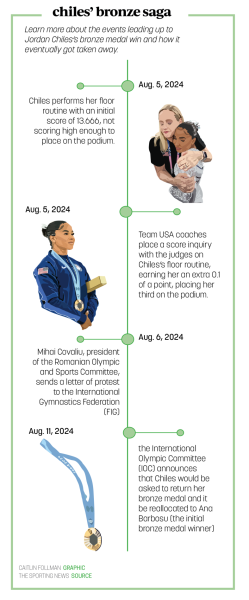Alert your friendly neighborhood Spider Man because Jordan Chiles has been ROBBED. In mid-August, the Court of Arbitration for Sport (CAS) stripped Chiles of her bronze medal and instead awarded it to Romania’s Ana Barbosu even though Chiles earned a 13.766 compared to Barbosu’s 13.7 in the individual floor performance.

From the headlines alone, I remember first thinking that Chiles lost her standing because she committed some sort of heinous crime, but it turns out the situation was nothing she had control over and, in reality, an epic international comotion.
Regarding the rule in question, gymnasts can file scoring appeals any time between when their score is posted and the next gymnast’s score is; however, the last gymnast of the event only has one minute after their score is released. Essentially, whoever competes last has a disadvantage in the competition as they have less time to catch and report judging errors.
I can’t come up with any other reason for the 1 minute deadline besides wanting to wrap up the competition faster which isn’t a good reason to jeopardize these athletes’ results. In this particular case, Romania and Team USA are fighting over an alleged 4 seconds. Just 4 seconds that have caused countless measurements of time in stress on both sides as well as working hours of sports courts, media networks, coaching staffs etc. Was the 4 seconds really that important?
We’ve all heard “rules are rules” but just because something is a rule doesn’t necessarily mean it’s correct or should be upheld. A common example is an assignment due at 11:59 p.m. Yes, if a student submits at 12:01 a.m. it’s considered late and the student is at risk of receiving a late penalty, but they really shouldn’t be. No teacher wants to be up and grading at 12 in the morning so if the student submits before their teacher goes to grade their work then that should be just fine. No harm, no foul.
This homework example can’t possibly encompass the depths of the issue at present, but for argument’s sake let’s expand it anyways. A student is assigned a group assignment and they complete their share of the work but their partner, who agreed to submit it for the two of them, doesn’t do so in time. Why should the first student’s grade suffer for something out of their control? And no, they couldn’t just submit the assignment as well to be safe because their teacher specifically told the class, “Only one submission per group or I’ll take off points, don’t clutter my Canvas with double submissions.”
Professional gymnasts are in a similar pickle as they can’t submit scoring appeals on their own, they need their coaches for that. The job of professional athletes is simply to show up and give the best performance possible, something they consistently train for day and night. The responsibilities of logistics are then mostly delegated to their coaching staff and yet the athletes are the ones who stand to receive consequences on something totally separate from their actual job? Make it make sense.
If the International Gymnastics Federation (FIG) and other similar sporting organizations are so stead-fast and committed to the processes they’ve mandated, they must be willing to exhibit leniency and understanding of the extenuating circumstances that are unavoidable within their prized system.

































![AI in films like "The Brutalist" is convenient, but shouldn’t take priority [opinion]](https://hilite.org/wp-content/uploads/2025/02/catherine-cover-1200x471.jpg)









































![Review: “The Immortal Soul Salvage Yard:” A criminally underrated poetry collection [MUSE]](https://hilite.org/wp-content/uploads/2025/03/71cju6TvqmL._AC_UF10001000_QL80_.jpg)
![Review: "Dog Man" is Unapologetically Chaotic [MUSE]](https://hilite.org/wp-content/uploads/2025/03/dogman-1200x700.jpg)
![Review: "Ne Zha 2": The WeChat family reunion I didn’t know I needed [MUSE]](https://hilite.org/wp-content/uploads/2025/03/unnamed-4.png)
![Review in Print: Maripaz Villar brings a delightfully unique style to the world of WEBTOON [MUSE]](https://hilite.org/wp-content/uploads/2023/12/maripazcover-1200x960.jpg)
![Review: “The Sword of Kaigen” is a masterpiece [MUSE]](https://hilite.org/wp-content/uploads/2023/11/Screenshot-2023-11-26-201051.png)
![Review: Gateron Oil Kings, great linear switches, okay price [MUSE]](https://hilite.org/wp-content/uploads/2023/11/Screenshot-2023-11-26-200553.png)
![Review: “A Haunting in Venice” is a significant improvement from other Agatha Christie adaptations [MUSE]](https://hilite.org/wp-content/uploads/2023/11/e7ee2938a6d422669771bce6d8088521.jpg)
![Review: A Thanksgiving story from elementary school, still just as interesting [MUSE]](https://hilite.org/wp-content/uploads/2023/11/Screenshot-2023-11-26-195514-987x1200.png)
![Review: "When I Fly Towards You", cute, uplifting youth drama [MUSE]](https://hilite.org/wp-content/uploads/2023/09/When-I-Fly-Towards-You-Chinese-drama.png)
![Postcards from Muse: Hawaii Travel Diary [MUSE]](https://hilite.org/wp-content/uploads/2023/09/My-project-1-1200x1200.jpg)
![Review: "Ladybug & Cat Noir: The Movie," departure from original show [MUSE]](https://hilite.org/wp-content/uploads/2023/09/Ladybug__Cat_Noir_-_The_Movie_poster.jpg)
![Review in Print: "Hidden Love" is the cute, uplifting drama everyone needs [MUSE]](https://hilite.org/wp-content/uploads/2023/09/hiddenlovecover-e1693597208225-1030x1200.png)
![Review in Print: "Heartstopper" is the heartwarming queer romance we all need [MUSE]](https://hilite.org/wp-content/uploads/2023/08/museheartstoppercover-1200x654.png)




